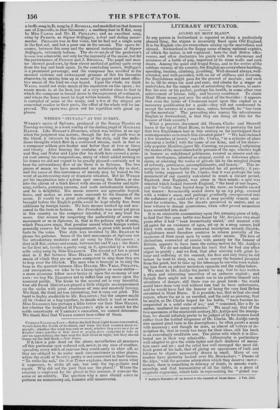WEBER'S " SYLVANA " AT THE SURREY.
WEBER'S opera of Sylvana, produced at the Surrey Theatre on Tuesday evening, is a work worthy of the darling pupil of MICHAEL HAYDN. Like MOZART'S Idumeneo, which was written at an age
when the judgment was mature, though the fire of youth was in the blood, it interests by the energy of the style, and the melo dious thoughts which flow in a continued stream, such in fact as a composer seldom gets fresher and better than at two or three and twenty. After hearing the cantatas of this author, Kampf
mid Sieg and Natur und Liebe (for his death here caused a general rout among his compositions, many of which added nothing to his fame) we did not expect to be greatly pleased—certainly not to hear the extraordinary flow of air there is in Sylvana. The two pieces of music we have mentioned are notoriously dry as dust, and the cause of this barrenness of melody may be traced to the want of an interesting story or dramatic situation. But let WEBER get his imagination into a sylvan spot among the fairies, or else into the gloom of a thick forest with storms of thunder and lightning, robbers, yawning caverns, and such melodramatic horrors, and he is delightful. His music renews our agreeable boyish fears, and makes us once more succumb to the illusion of the scene. It would be a great advantage if the operas that are brought before the English public could be kept wholly free from additions by foreign hands. We hate messes cooked up and seasoned to the taste in fashion. Der Freischiitz was never yet given in this country as the composer intended, if we may trust his score. Our reason for suspecting the authenticity of some one movement or so in Sylvana, is, that in the polacca style of song, which PHILIPPS sings, that peculiar accent which foreign writers generally reserve for the accompaniment, is given with much bad taste to the voice. This style was invented by Mr. BRAHAM to please the galleries. Some of the best movements of Sylvana are the introductory recitative and air sung by Miss GRADDON ; duet in 13 flat, serious and comic, between her and VALE ; the finale to the first act, besides a pretty song in E, (preceded by a violoncello solo) sung by Miss GRADDON. The second act has a grand duet in E flat between Miss HELMS and Mr. YARDLEY; the music of which they are no more competent to sing than they are to leap over the Obelisk. The man who is brought in to sing the bass in the quartett between Miss HE LME, Mrs. VALE, PHILIPPs, and anonymous, we take to be a lamp-lighter or scene-shitter — a more atrocious fellow never broke in upon the economy of our ears : we beg Mr. ELLISTON not to inflict him any more upon the innocent public. The finale to the second .act is very beautiful. Our old friend MOUNTAIN played a little obligato accompaniment on the violin with great sweetness of tone and masterly bowing. We think the third act less interesting, but it runs out good. The band is highly creditable to Mr. ELLISTON ; but the singers might all be shaken in a bag together, to decide which is best or worst. Miss GRADDON has perhaps a little better ear than Miss HeLme, but whether the bombast of Pmeirps's style is a match for the noble uncertainty of YARDLEY'S execution, we cannot determine. We thank God that WEBER cannot hear either of them.


















 Previous page
Previous page